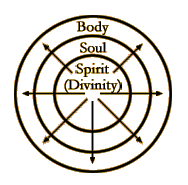
 |
Deeper Meaning—The RevelationIntrinsic Significance—The Accomplishments of Christ’s ResurrectionThe Firstborn Son of God“Not many Christians realize that to Jesus Christ resurrection was a birth. Incarnation was His birth as a man, but resurrection was His birth in His humanity as the firstborn Son of God” (Matthew 1:21; Luke 2:11; Acts 13:33; Romans 8:29) (Witness Lee, Basic, 29). Thus, Christ has passed through two births. The first birth took place at His incarnation, and the second, in His resurrection. In the first birth He was born as a son of man. After living on earth for thirty-three and a half years, Christ was crucified. In His resurrection, Christ as the Son of Man was begotten again to be the Firstborn Son of God (Witness Lee, Conclusion, 328).
Before His resurrection, Christ was already the Son of God (Matthew 16:16; John 5:18). Since He was already the Son of God, why did He need to be begotten as the Son of God in resurrection? Christ as the only begotten Son of God (John 3:16) is the Son of God in His divinity; but when Christ was incarnated, He put on an element, the human flesh, which had nothing to do with divinity. However, through His death and resurrection His humanity was “sonized” to also become the Son of God; that is, His human nature was uplifted, transformed, and brought into divinity. For this reason, Acts 13:33 tells us that in His resurrection Christ was born as the Son of God: “That God has fully fulfilled this promise to us their children in raising up Jesus, as it is also written in the second Psalm, ‘You are My Son; today I have begotten You’” (Witness Lee, Psalms, 34). Christ’s Becoming the Firstborn Son of God 
Another passage which addresses this second “birth” is Romans 1:3-4: “(3) Concerning His Son, who came out of the seed of David according to the flesh, (4) who was designated the Son of God in power according to the Spirit of holiness out of the resurrection of the dead, Jesus Christ our Lord.” Thus, in the aspect of His humanity, as the seed of David, Christ was born (designated in the power of His divinity—Romans 1:4) to be the firstborn Son of God in resurrection (Acts 13:33; Romans 8:29; Hebrews 1:5-6). By His resurrection, Christ brought His humanity fully into the divine sonship and thus designated it as the Son of God. As a result, the Son of God now possesses both the divine nature and the human nature. As the only begotten Son of God, Christ was always God’s Son only in the aspect of His divine nature. Now, through the “birth” process of His resurrection, Christ as the Firstborn Son of God has become God’s Son in the divine nature as well as in the human nature (34). Firstborn Son of God | Life-Giving Spirit | Many Sons of God Person & Process | Intrinsic Significance |
|
|
Main |
Scriptural Basis |
Deeper Meaning |
Proclaimed & Received Copyright © 2000, 2002. Christian Websites. All Rights Reserved |